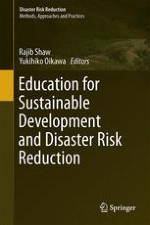2014 | OriginalPaper | Buchkapitel
2. Education for Sustainable Development: Trends and Practices
verfasst von : Yukihiko Oikawa
Erschienen in: Education for Sustainable Development and Disaster Risk Reduction
Verlag: Springer Japan
Aktivieren Sie unsere intelligente Suche, um passende Fachinhalte oder Patente zu finden.
Wählen Sie Textabschnitte aus um mit Künstlicher Intelligenz passenden Patente zu finden. powered by
Markieren Sie Textabschnitte, um KI-gestützt weitere passende Inhalte zu finden. powered by
